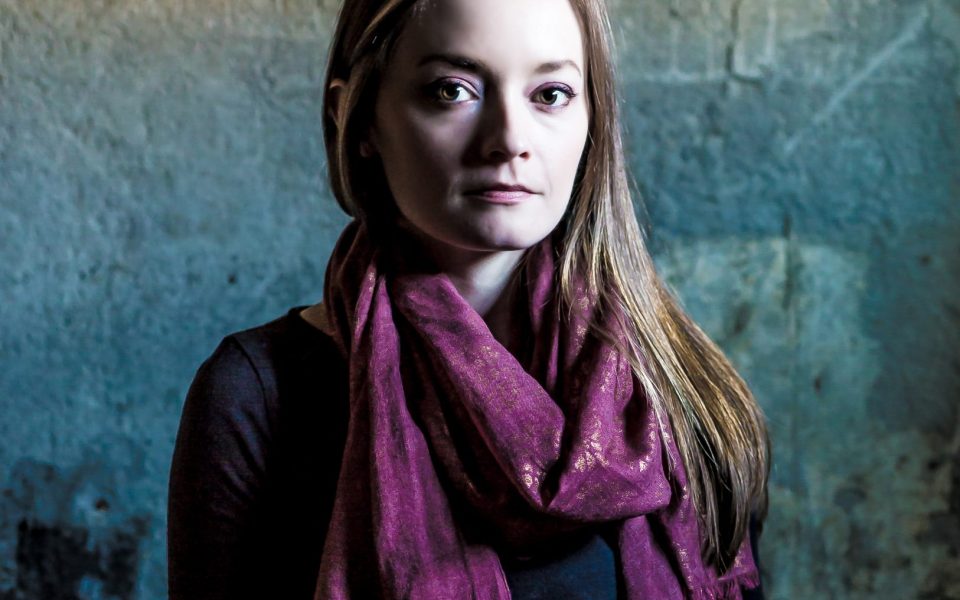Some might say tradition is risky, formulaic, that there can be no true artistry in it. But with her latest album compiled solely of traditional songs, it’s evident that singer-songwriter Lindsay Straw’s creativity runs deep.
Her latest album The Fairest Flower of Womankind is a necessary step forward for the young musician since her 2015 debut record My Mind From Love Being Free. Continuing to steer clear from the practice of writing all original songs to fill the record, Straw looked for the hidden life force breathing through poetic lyrics of traditional Irish, Scottish and British folk songs. The result was the presence of strong, outspoken women as heroes.
“I don’t look at these as old songs,” Straw said. “They have a lot of relevance to my life and to society today.”
The Fiddle and Bow Society of North Carolina brought Straw to Muddy Creek Music Hall on Jan. 19. A nearly sold-out performance, Straw’s set consisted mostly of songs from her latest album.
“I fell in love with traditional songs because of the stories,” Straw told the crowd. “But I also became obsessed with these songs I was finding for the album. While all the men were off at war, the women were left home to keep everything running. I just love these songs of powerful women who save the day.”
With a voice as bold and beguiling as the songs she chooses, Straw carries the torch of traditional folk music with striking elegance and a fierce breath of originality. A graduate of Berklee College of Music in Boston, both her voice and guitar technique demand attention; although she is still only beginning to break the surface on the national scene, Straw’s talents and potential are just beginning to be tapped.
The old, weathered wood floors and remaining antique industrial equipment that was once used in the old Bethania Mill but now decorates Muddy Creek Music Hall fit with the folk melodies. Straw’s charming smile and spritely stage presence easily held the audience’s attention, but in the middle of the set she laid her guitar down and repositioned herself a little higher on the stool.
“I’ll give my hands a rest for a moment,” Straw said.
As a prominent feature of her live performances, Straw began telling the history of the song “Ballad of Garyowen” and its songwriter, Robert Emmet Dunlap. She closed her eyes for a moment and slid gently into the Irish dance song. Her voice commanded the centuries-old melody with grace. And although the a cappella interlude was beautiful on its own, hearing it with the backstory and history in mind brought the song even more to life.
Beyond the songs, Straw’s passion for the history of the music is matched only by her seemingly limitless abilities. The charming anecdotes of the people behind the songs bridge the gap between past and present, connecting listeners to a Celtic past in order to make sense of the future. Singing old tunes by such folk masters as Lizzy Higgins, Brian Peters and Robert Graves, Straw is keeping a tradition, an entire history of music alive. The set also featured “The Heron,” one of Robert Graves’ songs from a collection of Irish and Scottish ballads. While many of the songs collected were only lyrics, Straw seized the opportunity and wrote melodies, expanding the tradition in a new way.
While one could argue that simply playing songs written centuries ago by other artists is far from artistry, there is a striking beauty in tradition that gets lost in the endless search for the fresh and new. While fans, critics and artists alike are searching for a birth of new wonder, of brilliant originality, Straw has excavated voices that might otherwise have been lost.
Join the First Amendment Society, a membership that goes directly to funding TCB‘s newsroom.
We believe that reporting can save the world.
The TCB First Amendment Society recognizes the vital role of a free, unfettered press with a bundling of local experiences designed to build community, and unique engagements with our newsroom that will help you understand, and shape, local journalism’s critical role in uplifting the people in our cities.
All revenue goes directly into the newsroom as reporters’ salaries and freelance commissions.


Leave a Reply